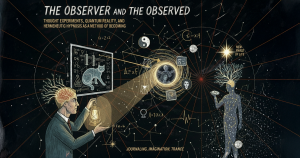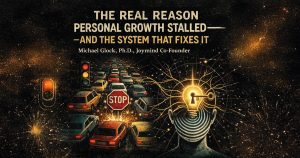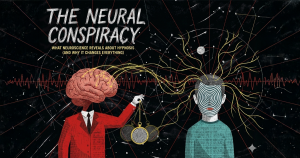Life can feel overwhelming, especially when tough decisions and routines leave you feeling drained and stuck. But new findings in neuroscience and hypnotherapy reveal techniques that can help you boost your intelligence and resilience, enabling you to break free from unhelpful patterns and make better choices. Here’s how Joymind’s innovative hypnotherapy can support you in achieving mental strength and clarity.
Stepping Back for Clarity: Self-Distancing
One simple but powerful tool for resilience is self-distancing. This means taking a step back mentally to view your experiences from an outsider’s perspective. Studies have shown that this practice reduces stress and rumination, helping you think more clearly and make better decisions (Kross & Ayduk, 2017).
Imagine watching a challenging situation in your life as though you’re an observer. This can reduce emotional overwhelm and lead to clearer, more balanced thinking. Self-distancing has helped leaders, entrepreneurs, and others to maintain calm, think rationally, and make informed choices, even under pressure (Grossmann & Kross, 2014).
Hypnotherapy and the Brain’s Ability to Change
At the heart of our mental adaptability is neuroplasticity—our brain’s natural ability to form new connections. Research shows that targeted therapies, like hypnotherapy, can leverage neuroplasticity, helping us adapt and learn new ways of thinking (Davidson & McEwen, 2012).
Hypnotherapy taps into this by accessing the subconscious mind, where deep-seated beliefs and habits live. Studies show that hypnotherapy can enhance specific brainwave patterns associated with learning and flexibility, helping people overcome negative thinking and increase problem-solving skills (Gruzelier, 2014). Joymind’s programs use these findings to create sessions designed to build resilience and clear mental blocks.
Building Resilience and Focus
Hypnotherapy sessions can boost cognitive functions, such as memory, focus, and decision-making. By lowering stress and anxiety, hypnotherapy gives you mental space to think more clearly, making it easier to tackle complex tasks. Self-distancing, too, helps in this regard, providing a broader perspective that reduces stress and improves your capacity to handle challenges (Kross et al., 2014).
Joymind combines these techniques in its hypnotherapy sessions, helping you manage stress effectively and keep a resilient mindset.
Hypnotherapy for Emotional Control
Emotional balance is key to mental clarity and resilience. Hypnotherapy accesses the subconscious mind, where emotions and reactions are often rooted, allowing you to reframe emotional responses and lessen the impact of negative triggers. Research shows that hypnotherapy can activate areas in the brain responsible for emotional regulation, making it easier to maintain focus and clarity (Oakley & Halligan, 2013).
Joymind’s sessions include calming techniques like deep breathing and visualization to reduce stress and enhance resilience, empowering you to face life’s challenges with more control.
Joymind’s Science-Backed Approach
By combining the latest neuroscience with hypnotherapy, Joymind provides transformative sessions that go beyond traditional methods. Targeting the subconscious mind, Joymind’s programs help clients reduce mental blocks like stress and anxiety and improve both intelligence and resilience.
In a fast-paced world that demands mental strength and adaptability, Joymind’s neuroscience-backed hypnotherapy is a powerful way to enhance intelligence and resilience. Joymind’s unique, personalized approach to hypnotherapy offers tools that are practical, sustainable, and proven to make a real difference.
References
- Davidson, R. J., & McEwen, B. S. (2012). Social influences on neuroplasticity: Stress and interventions to promote well-being. Nature Neuroscience, 15(5), 689–695. https://doi.org/10.1038/nn.3093
- Grossmann, I., & Kross, E. (2014). Exploring Solomon’s Paradox: Self-distancing eliminates the self-other asymmetry in wise reasoning about close relationships in younger and older adults. Psychological Science, 25(8), 1571–1580. https://doi.org/10.1177/0956797614535400
- Gruzelier, J. H. (2014). EEG-neurofeedback for optimising performance. I: A review of cognitive and affective outcome in healthy participants. Neuroscience & Biobehavioral Reviews, 44, 124–141. https://doi.org/10.1016/j.neubiorev.2013.09.015
- Kross, E., & Ayduk, Ö. (2017). Self-distancing: Theory, research, and current directions. Advances in Experimental Social Psychology, 55, 81–136. https://doi.org/10.1016/bs.aesp.2016.10.002
- Oakley, D. A., & Halligan, P. W. (2013). Hypnotic suggestion and cognitive neuroscience. Trends in Cognitive Sciences, 17(2), 123–130. https://pubmed.ncbi.nlm.nih.gov/19428287














